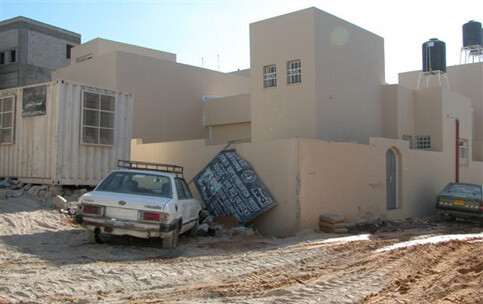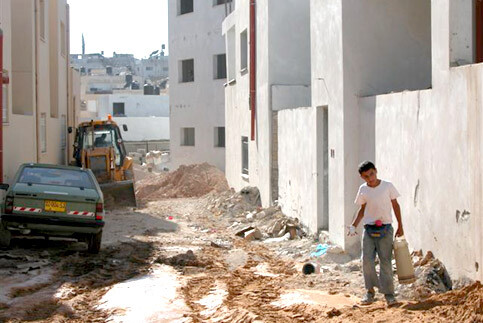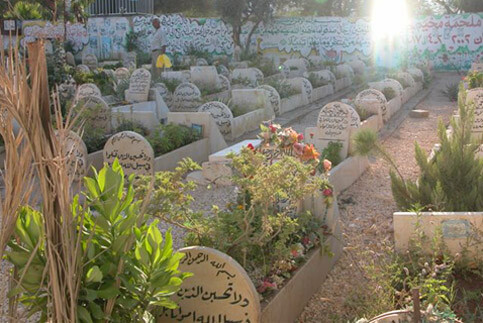United Nations Relief and Works Agency for Palestine Refugees in the Near East 16 December 2004

The 435 new homes built by UNRWA cover the 17,000m2 that was destroyed within the camp boundary and an additional 14,000m2 built on new land purchased outside the camp by the UAE Red Crescent. (Markus Cuel)
The main United Nations agency helping Palestinian refugees today handed over keys to new homes to most of the 435 families whose houses were destroyed during an Israeli incursion into the West Bank town of Jenin in 2002.
“The relief effort geared towards the refugees in Jenin and the rebuilding of their homes has been the biggest humanitarian project undertaken in the occupied Palestinian territory since the outbreak of the conflict four years ago,” UN Relief and Works Agency for Palestine Refugees (UNRWA) Commissioner-General Peter Hansen said, referring to the latest Palestinian intifada, or uprising.

New infrastructure has been completed on both sites including roads, mains water, electricity, sewage systems and storm drains. (Markus Cuel)
The rebuilding was made possible by a $27 million donation from the Red Crescent Society of the United Arab Emirates, whose chairman, Khalifa Nasser Alswaidi, was at Mr. Hansen’s side during the ceremony. Among the hardest hit by the incursion, which Israel said it launched against terrorists using West Bank cities as bases, were 2,000 impoverished Palestinian refugees who were suddenly homeless.
Mr. Hansen thanked the Governments of Switzerland and Sweden who provided teams to clear the camp of ordnance and drivers to help get humanitarian aid and building materials into the area. The United States and France were also key donors of humanitarian relief in the months immediately following the fighting in the camp.
“International donors of varying sizes and outlook, from all parts of the globe, have come together to use UNRWA’s expertise to make a remarkable change to the lives of a desperately suffering population,” Mr. Hansen said. “It is my hope that this fresh start for Jenin camp will coincide with an improved situation for all of the Palestinians in the occupied territory.”
Jenin rebuilt
In April 2002 after weeks of savage fighting the centre of Jenin refugee camp was raised to the ground and the camp became the focus of world attention. Among the hardest hit in a traumatized community were 2,000 impoverished Palestinian refugees who were suddenly homeless.

The cemetry in Jenin. In April 2002, Israeli forces killed at least 52 Palestinians in Jenin. Many more were injured. (Markus Cuel)
The United Nations Relief and Works Agency for Palestine Refugees (UNRWA) undertook to rebuild their lost homes and repair hundreds of others. Despite the problems of unexploded ordnance, regular incursions, curfews, closures and the killing of the project’s British manager, the rebuilding of the lost homes in Jenin camp is now complete.
Peter Hansen, UNRWA’s Commissioner-General, was today joined by H.E. Khalifa Nasser Alswaidi, Chairman of the United Arab Emirates Red Crescent Society, in handing over keys to most of the 435 families whose homes have been replaced. The rebuilding of Jenin camp was made possible thanks to a US$27 million donation to UNRWA from the UAE Red Crescent.
The ceremony also marked the memory of H.H. Sheikh Zayed Bin Sultan Al Nahyan, the late President of the UAE, who was instrumental in financing the UAE Red Crescent’s work in Jenin. There were also representatives from the British Department for International Development (DFID), which provided the management team for the project.
UNRWA also thanked the Governments of Switzerland and Sweden who provided teams to clear the camp of ordnance and drivers to help get humanitarian aid and building materials into the camp. The United States and France were also key donors of humanitarian relief in the weeks and months immediately following the fighting in the camp.
Peter Hansen said: “The relief effort geared towards the refugees in Jenin and the rebuilding of their homes has been the biggest humanitarian project undertaken in the occupied Palestinian territory since the outbreak of the conflict four years ago. International donors of varying sizes and outlook, from all parts of the globe, have come together to use UNRWA’s expertise to make a remarkable change to the lives of a desperately suffering population. It is my hope that this fresh start for Jenin camp will coincide with an improved situation for all of the Palestinians in the occupied territory.”
The 435 new homes built by UNRWA cover the 17,000m2 that was destroyed within the camp boundary and an additional 14,000m2 built on new land purchased outside the camp by the UAE Red Crescent.
New infrastructure has been completed on both sites including roads, mains water, electricity, sewage systems and storm drains. Roads on both sites are wider than the old narrow alleyways of the camp - in compliance with the urban planning requirements of the Palestinian authority.
Community facilities are now under construction, including a new school, a community centre and an UNRWA Women’s Programme Center. They will be completed during the first half of 2005. Under a separate contribution, the UAE will rebuilt the camp’s main mosque.
In addition to the approximately 2,000 homeless refugees who will take up places in the 435 new shelters, thousands more whose homes suffered moderate damage during the April 2002 incursion benefited from a major repair programme.
Over 150 working days on the project, amounting to around one quarter, have been lost because of Israeli incursions or curfews in the camp. Additional delays have been caused by the difficulty of getting building supplies into the camp through the Israeli checkpoints that surround it.
Iain Hook, the original manager of the Jenin camp rehabilitation project, was shot and killed by an Israeli soldier inside the small project compound in the camp on November 22, 2002. Work was halted after his death. In May 2004 an Israeli force invaded the project office and detained the British project manager for several hours.
Work was halted in June 2004 after a shooting incident when threats were aimed at the project team by a disgruntled refugee family. UNRWA has worked hard throughout the project to settle disputes and answer refugee concerns through a committee of locals created for the purpose of liaising with the Agency.
More Information
Related Links